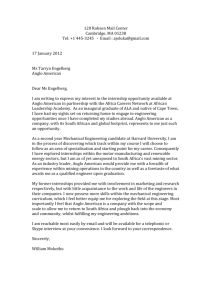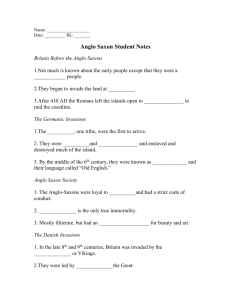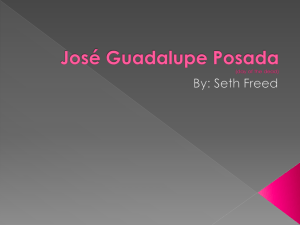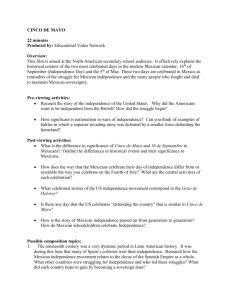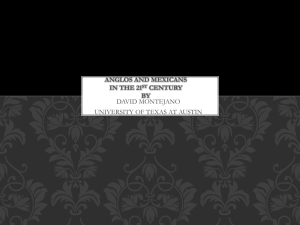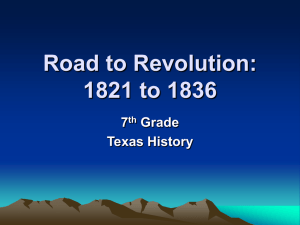Hist 366-Essay 2.doc
advertisement
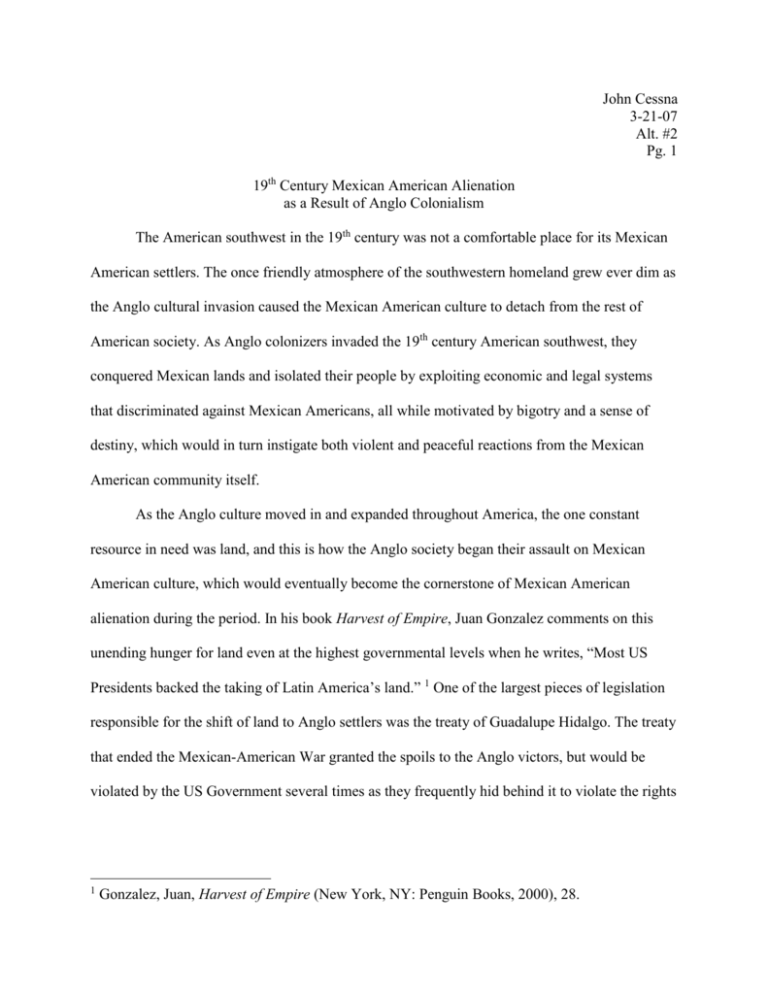
John Cessna 3-21-07 Alt. #2 Pg. 1 19th Century Mexican American Alienation as a Result of Anglo Colonialism The American southwest in the 19th century was not a comfortable place for its Mexican American settlers. The once friendly atmosphere of the southwestern homeland grew ever dim as the Anglo cultural invasion caused the Mexican American culture to detach from the rest of American society. As Anglo colonizers invaded the 19th century American southwest, they conquered Mexican lands and isolated their people by exploiting economic and legal systems that discriminated against Mexican Americans, all while motivated by bigotry and a sense of destiny, which would in turn instigate both violent and peaceful reactions from the Mexican American community itself. As the Anglo culture moved in and expanded throughout America, the one constant resource in need was land, and this is how the Anglo society began their assault on Mexican American culture, which would eventually become the cornerstone of Mexican American alienation during the period. In his book Harvest of Empire, Juan Gonzalez comments on this unending hunger for land even at the highest governmental levels when he writes, “Most US Presidents backed the taking of Latin America’s land.” 1 One of the largest pieces of legislation responsible for the shift of land to Anglo settlers was the treaty of Guadalupe Hidalgo. The treaty that ended the Mexican-American War granted the spoils to the Anglo victors, but would be violated by the US Government several times as they frequently hid behind it to violate the rights 1 Gonzalez, Juan, Harvest of Empire (New York, NY: Penguin Books, 2000), 28. Cessna Pg. 2 of Mexican Americans, often turning even more land over to Anglo settlers.2 This land pilfering was rarely a peaceful affair. California in 1850 would set the stage for one of the most violent upheavals in the regions history. State land commissioners forced the native born Californios to show ownership of land, breaking the time-honored tradition of squatters rights. Due to poor paperwork and records at the time, the vast majority could not produce the required papers and lost their land, which would subsequently be turned over to newly arrived Anglo settlers. The loss of hard earned land and the prospect of homelessness led to squatter riots throughout the region in 1850.3 Yet violence was not enough to force Anglo settlers from their path. Once Anglo culture had established a foothold in the southwest, they would continue to force Mexican Americans into isolation through bias government and economic means. Once well established, Anglos created systems of government and economic policy that would continue to put the Mexican American community at a disadvantage. The cornerstone of these systems’ bias was their basis on the English language. Gonzalez also weighs in on this lingual bias when he writes, “Anglo settlers routinely seized their properties, and those seizures were then upheld by the English-speaking courts the settlers installed.”4 In addition to land, Anglos would use their legal system to their economic advantage, cheating their way to the top in the mining industry. In 1850 the California state legislature enacted the Foreign Miners Tax to give Anglo miners the edge they needed to compete with the better skilled, more experienced 2 Gonzalez, Harvest, 99. Hist 366: Hispanic Heritage of the US. Lecture Date: 2-28-07 4 Gonzalez, Harvest, 30. 3 Cessna Pg. 3 Mexican American miners.5 Economic exploitations like these were leading causes in propagating the stereotype of Mexican Americans as cheap labor, and would only further alienate them.6 One of the worst violation of Mexican American rights came when California state legislature limited the right to vote to only white males, which was a direct violation of the Treaty of Guadalupe Hidalgo.7 The Mexican American people became isolated in their own lands because of the onslaught of the Anglo culture. As Anglos moved in, they did whatever they needed to take land from the current Mexican inhabitants and then established unjust and bias systems to keep them in check. These atrocities were motivated by an Anglo idea of destiny and a superiority complex founded in bigotry. The 19th century was a patriotic time to be an Anglo in America. The idea of “America for Americans” and “Manifest Destiny” motivated them to move westward and establish lives for themselves in Mexican lands. These settlers felt justified in doing whatever was needed to fulfill their “destiny” due to the patriotic rhetoric of the time. Gonzalez comments, “Proponents of Manifest Destiny saw Latin Americans as inferior in cultural makeup and bereft of democratic institutions.”8 In addition, Anglos of the era suffered from an intense superiority complex and viewed any Mexican American standing in their way as inferior. Put simply, they were racist bigots. Gonzalez quotes from phrenologist Dr. George Caldwell’s book Thoughts on the Original Unity of the Human Race written in the 19th century, “To the Caucasian race is the world indebted for all the great and important discoveries, inventions, and improvements, that have 5 Gonzalez, Harvest, 45. Hist 366: Hispanic Heritage of the US. Lecture Date: 2-23-07 7 Hist 366: Hispanic Heritage of the US. Lecture Date: 2-28-07 8 Gonzalez, Harvest, 43. 6 Cessna Pg. 4 been made in science and the arts.”9 And this was an attitude that would not end quickly. Even though large numbers of Mexican Americans fought and died for the Union during the Civil War, the Hispanic population was still included in the post-Civil War Jim Crow Laws.10 Anglo colonialists felt that they were committing no crimes against the Hispanic people as they dominated their way towards the pacific coast. Yet the Mexican American community found ways to resist the continued violation of their rights from the Anglo cultural onslaught. Mexican American citizens of the time recognized the actions of the Anglo settlers. Commenting on the Anglo invasion, Mexican Secretary of State Lucas Alaman said, “Where others sent invading armies, [the Americans] send their colonists.”11 Yet, Mexican Americans did not sit idly by. In fact, it was quite the opposite. Several Mexican Americans would respond to Anglo violations with physical violence. One such person was Juan “Cheno” Cortina. Of Cortina, Gonzalez writes, “Cortina’s band launched sporadic guerrilla raids into Texas from safe havens on the Mexican side…Cortina became the most feared Mexican American in Texas.”12 Additionally, these violent outbursts were not limited to sporadic events. In 1847, the Taos Revolt occurred in New Mexico where citizens revolted against pro-Americans, killing some in the process.13 Yet violence was not the only manner of resistance Mexican Americans practiced. Several non-violent groups and movements were formed during this time period in response to Anglo actions and doubled as a source of cultural values. One of the most successful non-violent projects came in the form of El Clamor Público, a Mexican American newspaper started in 9 Gonzalez, Harvest, 43. Hist 366: Hispanic Heritage of the US. Lecture Date: 2-28-07 11 Gonzalez, Harvest, 41. 12 Gonzalez, Harvest, 101. 13 Hist 366: Hispanic Heritage of the US. Lecture Date: 2-23-07 10 Cessna Pg. 5 southern California in the mid 19th century, which literally translates to “the public’s cry” and boasted itself as the voice of the anti-Anglo people, while also serving as a beacon of traditional Mexican American culture in the region.14 The most solitary show of Mexican American strength came early in the 20th century when the League of United Latin American Citizens, or LULAC, was formed. Gonzalez shows how LULAC took the fight directly to the Anglo’s door when he writes, “LULAC’s goal from its inception was the complete assimilation of Mexicans and their acceptance as equal citizens by Anglo society. To accomplish that, LULAC made its chief goal teaching Mexicans to master English.”15 With English education as its primary goal, LULAC was directly taking on the English-based legal and economic systems established by the Anglos to hold legal power over the Mexican American population. Mexican American alienation in the 19th century southwest was directly caused by Anglo colonization. These settlers moved in and took lands from Mexican Americans who had been living on it for, in some cases, generations. When land was not enough, Anglos established systems that had deliberate biases against Mexican Americans, which would give Anglos the edge in legal and economic pursuits. All of this was justified in Anglo eyes due to the patriotic rhetoric of the era combined with a superiority mindset, the cornerstone of which was ignorant racism. Despite these obstacles, the Mexican American community found strength to bond together and form their own cultural assault on the Anglo invaders, both in violent and peaceful manners. 14 15 Hist 366: Hispanic Heritage of the US. Lecture Date: 2-28-07 Gonzalez, Harvest, 103.
